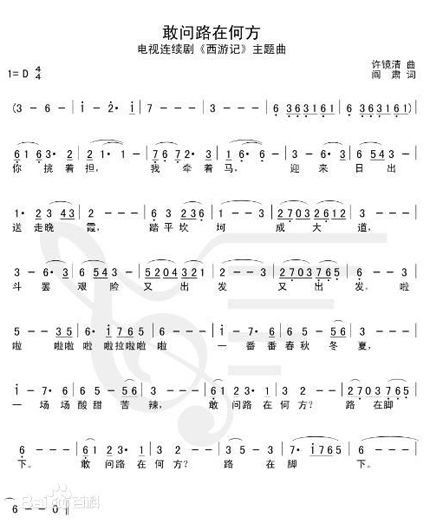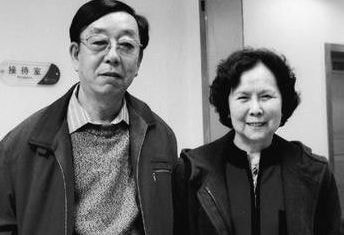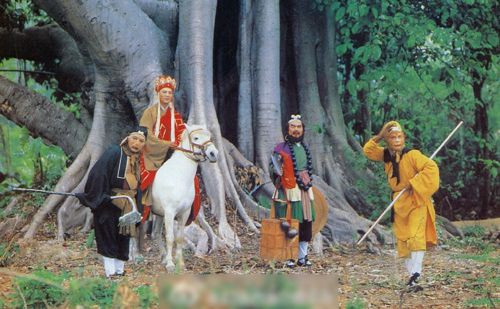The theme song of 'Journey to the West' - the song that almost "died young"
The song "Xin hoi duong o noi dau" was once considered unsuitable for the soundtrack of "Journey to the West" because the theme was too modern and used electronic sounds.
Where to Go was released 30 years ago and is ranked among the most famous Chinese film soundtracks of all time. To this day, this song is still performed by many veteran singers in performances or chosen as background music at events. In 2001, the work topped a poll of the most favorite song of Chinese people.
 |
| The song "Please ask the way somewhere" |
Please Ask Where the Road Is was composed by Hua Jingqing and written by Yan Su. The lyrics are not long but contain rich content, praising Sun Wukong's bravery in defeating demons and evil spirits while also depicting the spirit of overcoming difficulties of the four masters and disciples of Tang Monk. In the book Please Ask Where the Road Is (Jiangsu Literature and Arts Publishing House, 2012), director Yang Jie said she especially liked the line "Throughout the spring, summer, autumn and winter, through the bitterness and sweetness, please ask where the road is, the road is right under your feet."
The melody of Xin hoi duong o noi dau comes from very ordinary images in life. One day, while sitting in his room thinking about what to compose, Hua Kinh Thanh looked outside and saw a hired worker eating a lunch box. After eating, he hummed a song while tapping on the box. The inspiration for the song's prelude came from there.
Another time, while walking on the street, Xu Jingqing saw many stalls outside the Zoo. The cries of sales were heard everywhere. "Seeing so many people struggling to make a living, I suddenly felt a lot of emotions. Music played in my head." At that time, Xu Jingqing did not have a pen and paper with him, so he tore open the cigarette pack in his pocket, ran to borrow a pencil and wrote the music notes on the cigarette pack.
Musician Xu uses electronic sounds, guitars, and electronic drums for his songs. "Before me, almost no one had used electronic music in Chinese TV dramas," the musician said.
 |
| Director Yang Jie and musician Xu Jingqing. |
Composing a song is the inspiration and talent of the musician, but whether it is chosen for the soundtrack or not is a story about the director's vision and determination.
When it was first released, Xin hoi duong o dau was criticized by the press as inappropriate. Yang Jie's superiors also gave very harsh opinions. Music experts at that time thought the theme song was too "Western", especially the use of electronic sounds. They commented that this type of music could not be used for classical masterpieces. These responses made musician Hua extremely disappointed, he thought the collaboration with the director was dead.
In reality, it didn't happen like that. In her book, director Duong Khiet wrote that she couldn't help but think about her superiors' suggestions, but as a director, she needed to have her own opinions and couldn't just "make do in the middle of the road." The female director said that she spent a lot of time and effort to find a satisfactory theme song and decided not to change it unless she found a more satisfactory version.
Therefore, Duong Khiet wrote a letter to his superiors with firm words: "I think the problem with the film's music does not lie in its rusticity or Westernization. Journey to the West is a mythological film, not limited by time or region. In the film, there is the Jade Emperor in the sky, the King of Hell on earth, the Dragon King under the sea... Which era are they from?... Furthermore, which region does the magical fairy world in the sky and on the sea belong to? Forcing the music of Journey to the West to have the breath of the time and place, isn't that a lack of understanding of the myth? The world of Journey to the West is extremely vast, our imagination should also be rich and soaring. If we only use traditional musical instruments, wouldn't it be too monotonous?"
 |
| Tang Monk and his disciples in "Journey to the West". |
"I don't agree to change the theme song, because Hua Jingqing's song is free-spirited, melodious and fresh. He's not famous but that's okay, I don't need his fame, I need the song," she added.
Yang Jie then emphasized to her superiors that she was the director of Journey to the West and was responsible for the artistic aspects of the work. She asked him not to interfere with her work. Thanks to that determination, Where to Ask for the Way (performed by Jiang Dawei) became the song that ran throughout the work, and was also the song that resounded on the set of Journey to the West, encouraging the crew's spirit during the period of scarcity.
According to VnExpress
| RELATED NEWS |
|---|
